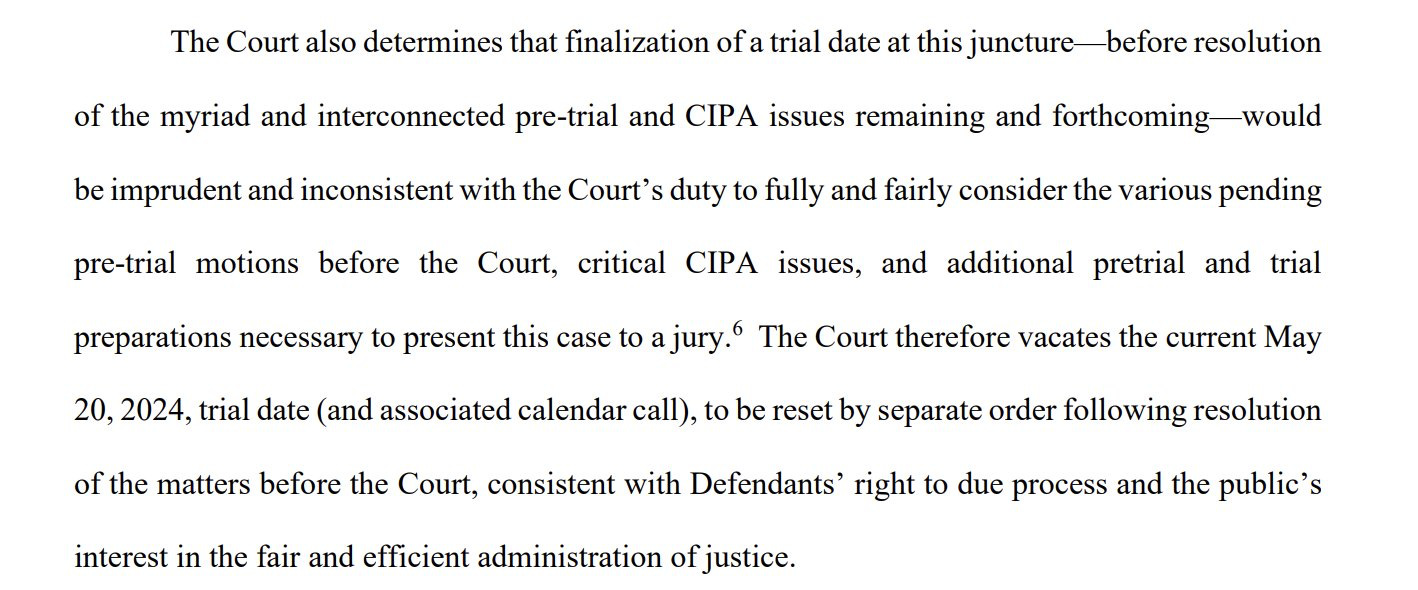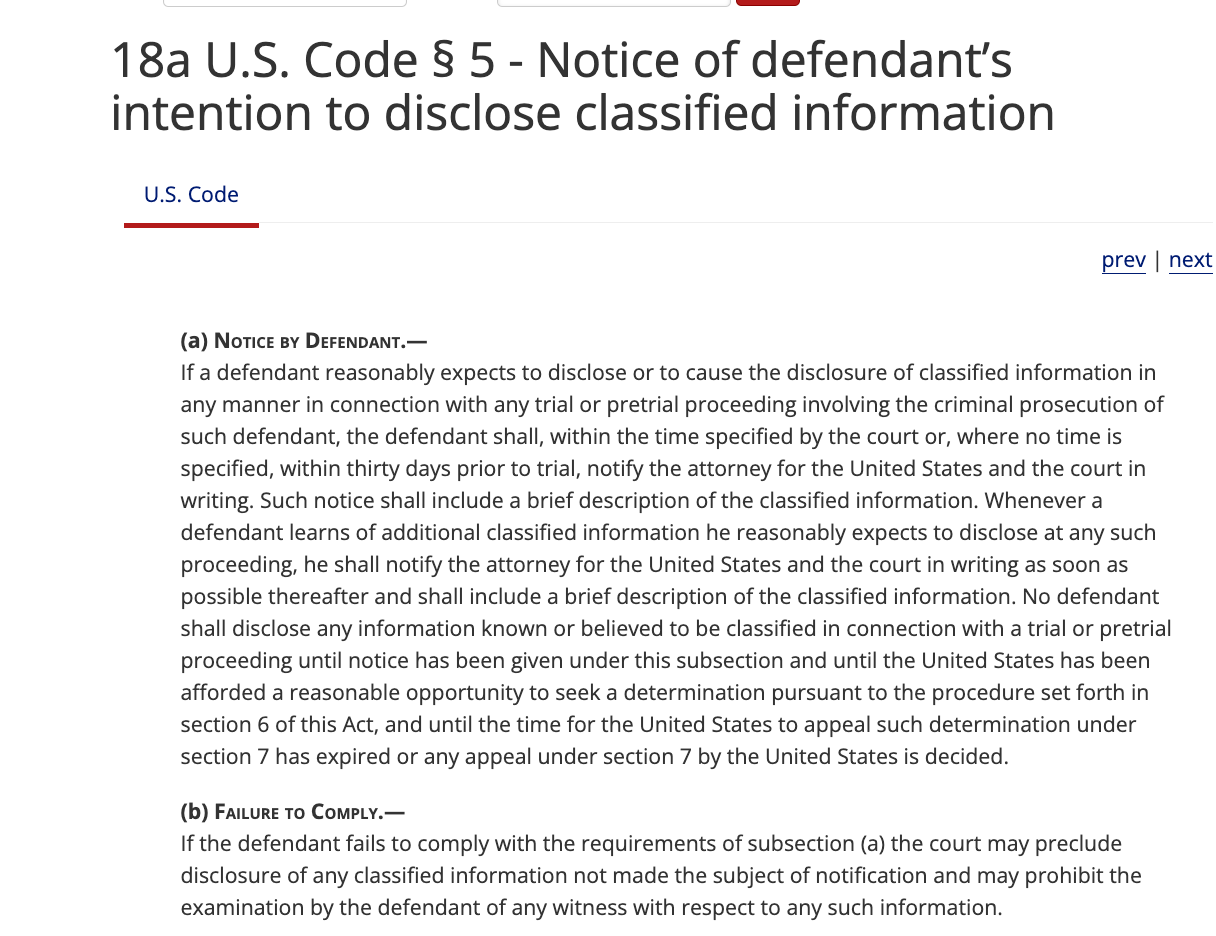Mar-a-No-Go
There was little doubt before last week that federal Judge Aileen Cannon was determined to delay Trump’s criminal case in front of her—the Mar-a-Lago classified documents case—until after the election. Now, there is none.
It’s been apparent for months that the May 20 trial date in this case wasn’t going to be the actual start of trial, as the Judge let critical motions stack up and refused to rule. This week, she announced that the trial date was off, and then she refused to set a new one. Special Counsel Jack Smith had asked for a July trial date, but Judge Cannon said it would be “imprudent and inconsistent” with her duty to “fairly consider the various pending pre-trial motions … [and] … critical CIPA issues … necessary to present this case to a jury.”

This case could and should have been ready for trial in December or January if she had been working on the motions and realistic deadlines all along.
Judge Cannon’s action here bears a striking similarity to what Trump asked her to do back in July of 2023, when he and co-defendant Walt Nauta filed a joint motion asking her to “postpone initial consideration of any rescheduled trial date until after substantive motions have been presented and adjudicated.” She didn’t then; she scheduled the May trial date. But now, she has given Trump what he wanted all along, and it’s contrary to what the law directs judges to do.
The Speedy Trial Act provides that, “In any case involving a defendant charged with an offense, the appropriate judicial officer, at the earliest practicable time, shall, after consultation with the counsel for the defendant and the attorney for the Government, set the case for trial on a day certain, or list it for trial on a weekly or other short-term trial calendar at a place within the judicial district, so as to assure a speedy trial.” Refusing to set a trial date is not what the rules authorize federal judges to do; in fact, the rules direct judges to set a trial date at the beginning of the case, before all of the motions are even filed. Here, we have a Judge who won’t set a trial date because of eight motions that are still pending on her docket because she has refrained from deciding them.
There are eight substantive pretrial motions still pending. Two of them are not public. Judge Cannon has set hearings for all of them and also calendared other deadlines and items the parties still need to file between now and late July:
May 8: Sealed telephonic hearing on grand jury matters
May 20: Resolve pending requests to seal certain items
May 22: Non-evidentiary hearing on Nauta’s motion to dismiss for selective and vindictive prosecution
May 22: Non-evidentiary hearing on defendant’s motion to dismiss the indictment for failure to plead a crime
May 31: Discovery status reports
June 10: Defendants’ disclosures of expert witnesses they intend to call
June 17: CIPA Section 5 notices from defendants
June 21: Motion to dismiss the indictment, arguing the appointment of a Special Counsel is unconstitutional
June 24 to 26: Hearing to determine scope of the prosecution team
July 9: Supplemental disclosure of expert witnesses by Special Counsel
July 10: Special Counsel’s CIPA disclosures under Section 6(a)
July 19: Speedy Trial Act report
July 22: Status conference for the parties with the court
July 22: Supplemental CIPA hearing for Section 4 (this will be sealed)
The motions Judge Cannon has decided merit a hearing include ones most judges would have given short shrift to. Trump has filed a motion to broaden the scope of what is meant by “prosecution team,” which determines how broadly prosecutors are required to search for discovery that must be turned over to a defendant. He thinks that instead of just prosecutors and agents—the usual definition—it should include folks in the White House, the intelligence community, the National Archives, and others; all of them people who were neither investigators nor witnesses for this case. But Judge Cannon has set that motion for a three-day hearing from June 24-26. It sounds like she’s serious about a motion that would be routinely denied in any other court, forcing the government to needlessly expend time and resources only to give the Judge an excuse to delay the case further.
By holding hearings on these motions, Judge Cannon is also giving Trump a public platform to legitimize his baseless allegations that the prosecution is a politically motivated witch hunt that is proceeding under Joe Biden’s direction. There is no support for any of this—Trump not only kept classified information he was not entitled to, spreading it across bathrooms and ballrooms at Mar-a-Lago in a careless fashion, he also obstructed efforts by the government to get it back as well as the criminal investigation, in a way that clarifies his intent to violate the law. But Judge Cannon will give the arguments legitimacy by holding hearings, and since there are no cameras in her courtroom, Trump will be free to say whatever he wants to when he walks outside of it.
All of this is consistent with Judge Cannon’s earlier treatment of the government. Anything Trump says is treated with gravity, no matter how silly. But the government’s legitimate concerns are ignored. For instance, last November, Trump’s lawyers asked Judge Cannon for a trial delay because of the scheduled trial date with Judge Chutkan in the District of Columbia. But there was just one problem: they neglected to advise Judge Cannon that they were filing a motion the same day asking to delay the case in the District of Columbia.
The government flagged what Trump’s lawyers were doing for Judge Cannon, in a brief notification. So, of course, Judge Cannon, incensed that Trump’s lawyers would try to deceive her, chastised them and denied their motion.
Well, actually, no. She didn’t. Instead, she chastised the Special Counsel’s office for exceeding the 200-word limit in the local rules for a notice of this type by 17 words. And she never took any action against Trump’s lawyers for deceiving the court. That’s precisely the kind of judicial thumb-on-the-scale crazy that the government has been contending with from the start of this case.
Judge Cannon will finish up with pre-trial motions, if she sticks to her schedule better than she has in the past, by the end of July. She could theoretically get the case ready to go to trial before the election. The reason we know that won’t happen in practice is because of the issues surrounding the use of classified documents at trial. We’ve discussed the statute that governs that process, the Classified Information Procedures Act (CIPA), in the past. A key step in the CIPA process for deciding how to use classified material at trial without endangering national security comes when the defendant files a Section 5 notice. That notice advises the government about what classified discovery a defendant wants to use at trial.
CIPA requires defendants in Espionage Act cases, like Trump, to give the government notice if they intend to use any classified discovery as evidence at trial. This permits litigation over whether that evidence can be introduced well in advance of trial to avoid the prospect of a defendant "gray mailing" the government into dismissing charges to avoid damage to national security.
The Special Counsel has already provided Trump with classified materials he is entitled to in discovery in the case. Three critical pre-trial steps for handling classified information under Sections 5 and 6 of CIPA still have to be completed:
The defendant has to submit a detailed written notice that spells out any classified information he expects to disclose in connection with the trial.
If the government wants one, the court holds a hearing pursuant to Section 6(a) to determine what evidence that the defendant has identified can be used at trial.
After the Judge makes that decision, the prosecution can move to substitute redacted versions of the original classified documents, admit certain facts are true to avoid the need to use classified documents, or prepare summaries of classified information that can be shown to the jury.
That process was supposed to get set in motion last week, with Trump filing his notice. Once the Judge makes her decisions, the prosecution is entitled to take an expedited appeal to the Eleventh Circuit if it disagrees with any of them. But Judge Cannon extended the time for Trump to file his Section 5 notice until mid-June, pushing back the ultimate date when she will have to make one of her most important pre-trial rulings, knowing that it will be immediately scrutinized by the Court of Appeals that has already reversed her twice.
Trump's lawyers made a new claim last week to justify further delay in the proceedings. They wrote that prosecutors “failed to properly secure the classified materials at the heart of the case after seizing them nearly two years ago from Mar-a-Lago.” Although their allegations, at least at first blush, fall shy of a serious problem, apparently, it's enough for Judge Cannon.
Last Saturday night, Trump’s lawyers wrote to prosecutors, expressing outrage that “the prosecution team failed to preserve critical evidence relating to the location of documents within boxes obtained from Mar-a-Lago.” They claimed that the location of the documents would have helped to establish Trump’s innocence and demanded information about what they called the “mishandling of the boxes and documents.”
Or, as Trump put it on Truth Social the day before his lawyers sent their letter, “Now, Deranged Jack has admitted in a filing in front of Judge Cannon to what I have been saying happened since the Illegal RAID on my home, Mar-a-Lago, in Palm Beach, Florida – That he and his team committed blatant Evidence Tampering by mishandling the very Boxes they used as a pretext to bring this Fake Case.” It is more of the same from Trump. He spelled out where all of this is headed: “These deeply Illegal actions by the Politicized ‘Persecutors’ mandate that this whole Witch Hunt be DROPPED IMMEDIATELY. END THE ‘BOXES HOAXES.’ MAGA2024!” And, in another post, he went completely off the deep end, writing, “ARREST DERANGED JACK SMITH. HE IS A CRIMINAL!”
Prosecutors acknowledged in a court filing on Friday that “there are some boxes where the order of items within that box is not the same as in the associated scans.” They explained that in the course of moving boxes that weren’t completely full, some of the documents may have moved around. But all of the items remain in the right box, the scans are available in order, and the integrity of the documents is intact. This is not an issue—or at least it wouldn’t be in front of any other judge.
It’s not a cliche to say that justice delayed is justice denied. With this case, we understand exactly what it means. Defendants aren’t the only ones with Speedy Trial Act rights; they belong to the People, too—or at least, they’re supposed to.
We’re in this together,
Joyce




Joyce, Please clarify for your readers why Judge Cannon is facing no consequences from the Florida Bar, the DOJ, the ABA, or America's honest judges. It can't just be your loyal readers and other pro-democracy, anti-Trump Americans who are dismayed, if not disgusted, by Judge Cannon's outrageous ongoing violations of judicial norms and ethics. Is there anything the public can do to change this situation? I'm frightened that no one can hold this rogue judge to account -- a terrifying parallel to the rogue ex-president people are straining to hold to account.
So what would the result be if Jack Smith went to the 11th circuit to recuse Judge Cannon.